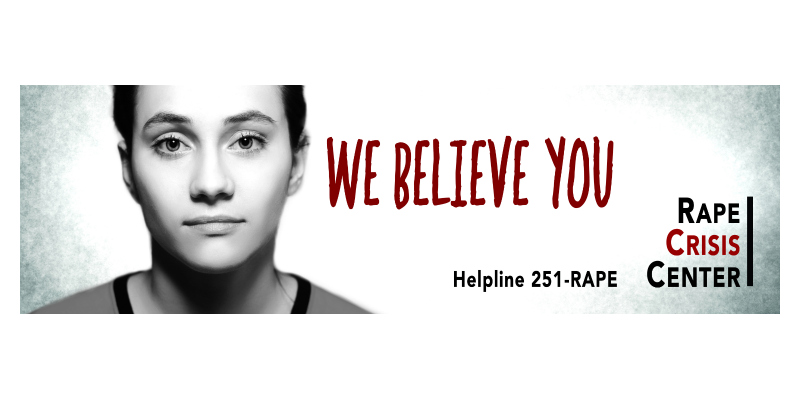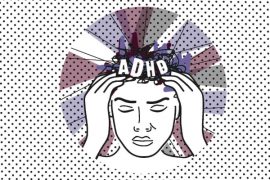Sexual Assault
It's an EpidemicAs you’ve made your way around Madison recently, you’ve probably noticed a new assortment of similar black-and-white billboards. The most powerful: a child looks out at you with sad, confused eyes. The billboard’s limited text makes a huge impression: “It’s Not Your Fault.”
The words could refer to anything, but then you read “Dane County Rape Crisis Center” below the child’s image and your stomach sinks. There is a strong desire to look away and think about other things, but this billboard represents a reality too common: Someone is sexually assaulted in the U.S. every 109 seconds and every eight minutes it is a child, according to the Rape, Abuse, and Incest National Network.
During the 2016 election cycle the term sexual assault was thrust into our everyday vocabulary. Despite the fact that sexual assault is not something we typically like to think about, much less talk about, it is an epidemic nationwide. Sexual assault is defined as unwanted sexual contact, where consent is not given freely. People most commonly think of rape as the standard definition of sexual assault. Much more common are the things society may brush off as “not a big deal” as we witnessed after a leaked audiotape of President-elect Donald Trump and television personality Billy Bush discussing the ease with which a male celebrity could “grab a woman’s pussy.”
According to the Wisconsin Department of Justice, this forcible fondling represents the most common form of sexual assault. While assaults like this don’t usually get much attention, Erin Thornley Parisi, executive director of the Dane County Rape Crisis Center, wants people to know that all sexual assault hurts and it is all unacceptable.
Sexual assault may be a physically sexual act, but it isn’t rooted in sexuality or sexual desire; it’s most often driven by the desire to control and a need for power. The Wisconsin Department of Justice reported 4,561 sexual assaults in 2014, the most recent year statistics were available from the department. That number includes 1,146 rapes.
In 2010, 89 percent of sexual assaults were committed by someone the victim knew and two-third of assaults were committed in the victim’s or the perpetrator’s home, not in a dark alleyway. Ninety-one percent of these assaults were committed by men.
The Rape Crisis Center’s Thornley Parisi is passionate about increasing awareness of the problem.
“As women, we earn less, our bodies are owned by whoever wants to touch or steal or sell or rape or beat them” Thornley Parisi says. “We aren’t represented everywhere. None of this should be normal. People need to understand there is a power and control over women that is everywhere. We are constantly operating in a state of vigilance and we don’t even pay attention to it anymore. I want us to stop thinking it’s no big deal to operate that way. I want women to be outraged…If we continue to treat women like second-class citizens and sexual objects women are going to be raped and sexually assaulted.”
When Thornley Parisi considers a world without sexual assault, she calls to mind successful prevention programs from the past, including the 1980s campaign for seat belt use and the massive prevention campaign by The Susan G. Komen Breast Cancer Foundation launched in the early ’90s.
Society is in desperate need of a large scale preventive movement to combat sexual assault, but the funding isn’t being provided by either local or federal government, Thornley Parisi says.
Thornley Parisi has a few suggestions for individuals looking to make a difference. She suggests teaching children very early about the concept of consent. Consent is not only applicable to situations related to sex, but many circumstances throughout the day, even the day of a child. For instance, ask before you tickle a child and respect to their response. Let children choose how they greet people, even relatives, and honor their decision. Thornley Parisi suggests open and honest communication from a very early age so that children will come to you if something is wrong. Teach your child, “I will always believe you.” Which, she quickly points out, is the motto of the Dane County Rape Crisis Center.
As adults, Thornley Parisi says it is our responsibility to call out others on their misogynistic jokes or comments, letting them know that we will not tolerate sexist language or conversation about women, even made in jest.
Out in public, Thornley Parisi encourages people to speak up if they see or sense something is not right. Call the police, draw attention to the situation and gather others to help you. If you sense a tense situation is just beginning, initiate a conversation with the victim. This lets the offender know that you are a friend and will protect the victim. Thornley Parisi admits that it is difficult to intervene, but she says, “you have to assume the worst, which is hard, but you can’t risk a woman’s health and well being when you know what a real possibility it is. We must value women enough to risk our own embarrassment.”





Comments are closed.